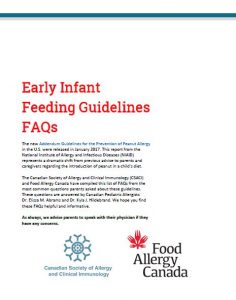Updated as of December 2019: Read the Canadian Paediatric Society’s updated recommendations on early introduction of allergenic foods for high-risk infants.
As the information below is now updated, please access our early introduction page for the most current content.
New guidelines for the introduction of peanut to babies
 January 2017: The Addendum Guidelines for the Prevention of Peanut Allergy in the U.S. (a report from the National Institute of Allergy and Infectious Diseases (NIAID)) has been released, and it is a very positive step forward in preventing the development of peanut allergy.
January 2017: The Addendum Guidelines for the Prevention of Peanut Allergy in the U.S. (a report from the National Institute of Allergy and Infectious Diseases (NIAID)) has been released, and it is a very positive step forward in preventing the development of peanut allergy.
The guidelines represent a dramatic shift from previous advice to parents and caregivers regarding the introduction of peanut in a child’s diet. It is critical that health providers including allergists, pediatricians, and general practitioners share consistent information, based on the recommendations, so that parents can make an informed decision.
Here are some highlights:
- The recommendations are based on the groundbreaking LEAP study which found that early introduction of peanuts to babies (4-11 months) identified as high risk for peanut allergy (based on an existing egg allergy and/or severe eczema), helped to prevent the development of peanut allergy.
- The guidelines provide specific advice for when to introduce peanut-containing foods to babies and how. They also include advice about introducing solids first, avoiding foods that can be choking hazards (e.g. whole peanuts), and specific instructions for babies considered to be “high risk”. There are three guidelines for when to introduce peanut-containing food –
- Guideline 1: As early as 4-6 months for those at high risk (severe eczema and/or egg allergy). Evaluation with testing is strongly recommended to determine if peanut should be introduced and the preferred method. Parents are advised to consult with their physician.
- Guideline 2: Around 6 months for those with mild to moderate eczema.
- Guideline 3: When age-appropriate, introduce freely in diet with other solid foods in accordance with family preferences and cultural practices.
- You can download the guidelines and summaries for parents/caregivers and clinicians on the NIAID website.
We discussed these points in media interviews on January 5th/6th, as did Canadian allergist Dr. Edmond Chan, a member of the NIAID expert panel. Click here for more on the Global TV national news story. You can also read the Allergic Living article which provides a great overview of the guidelines.
As always, we advise parents to speak with their physician if they have any concerns.
For parents: Recorded webinar on the new guidelines for the introduction of peanut to babies
We hosted a webinar in March 2017 with the Canadian Society of Canadian Society of Allergy and Clinical Immunology (CSACI) on the new guidelines for the introduction of peanut to babies.
The webinar was presented by Canadian Allergist Dr. Julia Upton who is on staff at Toronto’s SickKids Hospital in the Immunology and Allergy Department. She is an Assistant Professor in the Department of Paediatrics at the University of Toronto and is the Section Chair of Food Allergy and Anaphylaxis with the CSACI.
You can view a recording of the webinar below, which includes a question and answer period.
Parent resource: Frequently Asked Questions
Below is an FAQ document which includes the most common questions by parents, answered by Canadian allergists. Please click on the document to view.
For healthcare professionals: Recorded webinar on the new guidelines and additional resources
We hosted a webinar tailored to healthcare professionals in June 2017 with the Canadian Society of Canadian Society of Allergy and Clinical Immunology (CSACI) on the new guidelines for the introduction of peanut to babies.
This webinar was presented by Canadian Pediatric Allergist Dr. Edmond S. Chan who is the Head of the Division of Allergy & Immunology in the Department of Pediatrics, and Clinical Associate Professor at the University of British Columbia. He sees patients in the Allergy Clinic at B.C. Children’s Hospital. He is also a Clinical Investigator at the B.C. Children’s Hospital Research Institute, and runs a large research program dedicated to multiple aspects of pediatric food allergy and eosinophilic esophagitis. He is on the Board of Directors at the Canadian Society of Allergy and Clinical Immunology (CSACI) and he is on the Executive of the Allergy Section within the Canadian Paediatric Society. He is also the co-author for the U.S. NIAID (NIH) Food Allergy Guidelines on Prevention of Peanut Allergy recently published in January 2017.
You can view a recording of the webinar below.
Please see below for the five handouts that were available during this webinar:
- NIAID summary for clinicians
- NIAID complete addendum guidelines
- CSACI editorial on NIAID guidelines
- NIAID summary for parents and caregivers
- NIAID parent instructions for home feeding infants at low risk

